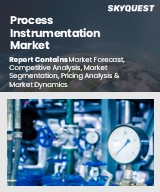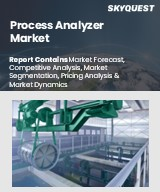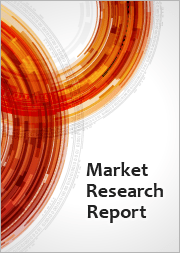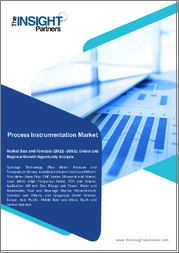
|
시장보고서
상품코드
1900814
프로세스 계측 시장 규모, 점유율, 성장 분석 : 계측 기기 유형별, 기술별, 최종 이용 산업별, 지역별 - 업계 예측(2026-2033년)Process Instrumentation Market Size, Share, and Growth Analysis, By Instrument Type (Transmitters, Control Valves), By Technology (Fieldbus, Wireless), By End Use Industry, By Region - Industry Forecast 2026-2033 |
||||||
세계의 프로세스 계측 시장 규모는 2024년에 197억 1,000만 달러로 평가되었으며, 2025년 203억 6,000만 달러에서 2033년까지 264억 달러로 성장할 전망입니다. 예측 기간(2026-2033년) 동안 CAGR은 3.3%로 예측됩니다.
석유 및 가스, 제약, 식음료, 화학 등의 분야에서 산업 자동화의 진전을 배경으로 세계 프로세스 계측 시장은 괄목할만한 성장을 거듭하고 있습니다. 이러한 산업들이 효율성, 안전성, 품질 안정성 향상을 목표로 하는 가운데 정밀 계측 장비를 활용한 자동화 시스템 도입이 필수적입니다. 이러한 기기는 압력, 유량, 온도, 레벨 등의 변수를 측정하고 제어하는 데 중요한 역할을 하며, 사람의 개입과 잠재적 오류를 최소화합니다. 무선 센서 및 IoT 통합을 포함한 센서 기술의 혁신으로 민감도, 정확도, 신뢰성이 향상되어 실시간 데이터 분석 및 예지보전이 가능해졌습니다. AI와 기계 학습의 통합은 의사결정 능력을 더욱 강화하고 다양한 산업 응용 분야에서 첨단 프로세스 계측의 보급을 촉진하여 궁극적으로 견고한 시장 성장을 촉진하고 있습니다.
세계 프로세스 계측 시장 촉진요인
세계 프로세스 계측 시장은 인더스트리 4.0의 발전에 힘입어 크게 성장하고 있습니다. 다양한 분야에서 자동화가 진행됨에 따라 고도의 공정 제어 시스템에 대한 수요가 증가하고 있습니다. 스마트 계측을 통해 실시간 데이터 모니터링을 가능하게 하고, 예지보전을 촉진하며, 전반적인 운영 효율을 향상시킵니다. 이러한 변화는 제조 및 에너지와 같은 주요 산업에서 특히 두드러지게 나타나고 있으며, 현대 기술의 통합은 전통적인 관행을 변화시키고 있습니다. 그 결과, 프로세스 계측 분야의 혁신적인 솔루션에 대한 필요성이 지속적으로 증가하여 시장을 발전시키고 다양한 분야의 산업 운영 최적화에 있어 중요한 역할을 강조하고 있습니다.
세계 프로세스 계측 시장 억제요인
프로세스 계측 시스템과 IoT 및 클라우드 기술과의 상호연결성 및 통합성이 높아짐에 따라 데이터 보안에 대한 우려가 커지고 있습니다. 특히 의료, 에너지와 같은 기밀성이 높은 분야에서는 사이버 공격과 데이터 유출 가능성이 고도화된 시스템 도입에 대한 심각한 우려를 낳고 있습니다. 결과적으로, 이러한 보안 취약점이 장벽이 되어 프로세스 계측 시장의 성장을 저해할 수 있습니다. 조직은 데이터 보호 및 업무 무결성에 대한 우려로 인해 혁신적인 솔루션 도입에 소극적일 수 있으며, 이는 업계 전반의 발전과 확장에 영향을 미칠 수 있습니다.
세계 프로세스 계측 시장 동향
세계 프로세스 계측 시장에서 산업용 사물인터넷(IIoT) 기술의 통합은 큰 흐름이 되고 있습니다. 이를 통해 기존의 운영 프레임워크가 데이터 중심의 고효율적인 에코시스템으로 변화하고 있습니다. 이를 통해 실시간 데이터 분석이 가능해져 제조, 에너지, 화학 등의 산업에서 모니터링 기능 강화, 예지보전, 정보에 입각한 의사결정을 할 수 있습니다. 조직이 스마트 계측 시스템 도입을 확대함에 따라 다운타임을 줄이고 리소스 관리를 최적화하여 운영 효율성과 생산성을 향상시킬 수 있습니다. 이러한 추세는 산업 성과 향상과 경쟁 우위 확보를 위해 커넥티드 디바이스와 스마트 기술에 대한 의존도가 높아지고 있음을 보여줍니다.
자주 묻는 질문
목차
소개
- 조사 목적
- 조사 범위
- 정의
조사 방법
- 정보 조달
- 2차와 1차 데이터 방법
- 시장 규모 예측
- 시장 가정과 제한
주요 요약
- 세계 시장 전망
- 공급과 수요 동향 분석
- 부문별 기회 분석
시장 역학과 전망
- 시장 규모
- 시장 역학
- 성장 촉진요인과 기회
- 성장 억제요인과 과제
- Porters 분석
주요 시장 인사이트
- 핵심성공요인
- 경쟁 정도
- 주요 투자 기회
- 시장 생태계
- 시장 매력 지수(2025년)
- PESTEL 분석
- 거시경제 지표
- 밸류체인 분석
- 가격 분석
- 규제 상황
- 사례 연구
- 기술 분석
세계의 프로세스 계측 시장 규모 : 기기 종류별 & CAGR(2026-2033년)
- 트랜스미터
- 제어 밸브
- 분석기
- 센서
- 레코더
세계의 프로세스 계측 시장 규모 : 기술별 & CAGR(2026-2033년)
- 필드버스
- 무선
- HART
- 기타
세계의 프로세스 계측 시장 규모 : 최종 이용 산업별 & CAGR(2026-2033년)
- 석유 및 가스
- 화학제품
- 발전
- 상하수 처리
- 식품 및 음료
- 의약품
세계의 프로세스 계측 시장 규모 & CAGR(2026-2033년)
- 북미
- 미국
- 캐나다
- 유럽
- 독일
- 스페인
- 프랑스
- 영국
- 이탈리아
- 기타 유럽
- 아시아태평양
- 중국
- 인도
- 일본
- 한국
- 기타 아시아태평양
- 라틴아메리카
- 브라질
- 기타 라틴아메리카
- 중동 및 아프리카
- GCC 국가
- 남아프리카공화국
- 기타 중동 및 아프리카
경쟁 정보
- 상위 5개사의 비교
- 주요 기업의 시장 포지셔닝(2025년)
- 주요 시장 기업이 채용한 전략
- 최근의 시장 동향
- 기업의 시장 점유율 분석(2025년)
- 주요 기업 개요
- 기업 상세
- 제품 포트폴리오 분석
- 기업 부문별 점유율 분석
- 매출 전년비 비교(2023-2025년)
주요 기업 개요
- Emerson Electric Co.(U.S.)
- Siemens AG(Germany)
- ABB Ltd.(Switzerland)
- Honeywell International Inc.(U.S.)
- Yokogawa Electric Corporation(Japan)
- Schneider Electric SE(France)
- Endress+Hauser Group(Switzerland)
- Rockwell Automation, Inc.(U.S.)
- General Electric Company(U.S.)
- Azbil Corporation(Japan)
- Mitsubishi Electric Corporation(Japan)
- Danaher Corporation(U.S.)
- Metso Corporation(Finland)
- Omron Corporation(Japan)
- Brooks Instrument(U.S.)
- KROHNE Group(Germany)
- Yamatake Corporation(Japan)
결론과 제안
KSM 26.01.21Global Process Instrumentation Market size was valued at USD 19.71 Billion in 2024 and is poised to grow from USD 20.36 Billion in 2025 to USD 26.4 Billion by 2033, growing at a CAGR of 3.3% during the forecast period (2026-2033).
The global process instrumentation market is witnessing notable growth, driven by rising industrial automation in sectors such as oil and gas, pharmaceuticals, food and beverage, and chemicals. As these industries strive for enhanced efficiency, safety, and consistent quality, the adoption of automated systems utilizing precise instruments becomes essential. These instruments play a crucial role in measuring and controlling variables like pressure, flow, temperature, and level, thereby minimizing manual intervention and potential errors. Innovations in sensor technology, including wireless sensors and IoT integration, improve sensitivity, accuracy, and reliability, enabling real-time data analytics and predictive maintenance. The incorporation of AI and machine learning further enhances decision-making capabilities, prompting wider adoption of advanced process instrumentation across diverse industrial applications, ultimately fostering robust market growth.
Top-down and bottom-up approaches were used to estimate and validate the size of the Global Process Instrumentation market and to estimate the size of various other dependent submarkets. The research methodology used to estimate the market size includes the following details: The key players in the market were identified through secondary research, and their market shares in the respective regions were determined through primary and secondary research. This entire procedure includes the study of the annual and financial reports of the top market players and extensive interviews for key insights from industry leaders such as CEOs, VPs, directors, and marketing executives. All percentage shares split, and breakdowns were determined using secondary sources and verified through Primary sources. All possible parameters that affect the markets covered in this research study have been accounted for, viewed in extensive detail, verified through primary research, and analyzed to get the final quantitative and qualitative data.
Global Process Instrumentation Market Segments Analysis
Global Process Instrumentation Market is segmented by Instrument Type, Technology, End Use Industry and region. Based on Instrument Type, the market is segmented into Transmitters, Control Valves, Analyzers, Sensors and Recorders. Based on Technology, the market is segmented into Fieldbus, Wireless, HART and Others. Based on End Use Industry, the market is segmented into Oil & Gas, Chemicals, Power Generation, Water & Wastewater, Food & Beverages and Pharmaceuticals. Based on region, the market is segmented into North America, Europe, Asia Pacific, Latin America and Middle East & Africa.
Driver of the Global Process Instrumentation Market
The global process instrumentation market is significantly fueled by the advancements brought about by Industry 4.0. As various sectors embrace automation, there is a growing demand for advanced process control systems. Smart instrumentation enables real-time data monitoring, facilitates predictive maintenance, and enhances overall operational efficiency. This shift is particularly evident in key industries like manufacturing and energy, where the integration of modern technologies transforms traditional practices. Consequently, the need for innovative solutions in process instrumentation continues to rise, driving the market forward and highlighting its pivotal role in optimizing industrial operations across various sectors.
Restraints in the Global Process Instrumentation Market
The rising interconnectivity and integration of process instrumentation systems with IoT and cloud technologies have heightened concerns regarding data security. The potential for cyberattacks and data breaches, especially in sensitive sectors like healthcare and energy, raises significant apprehensions about the implementation of advanced systems. As a result, these security vulnerabilities can act as a deterrent, hindering the growth of the process instrumentation market. Organizations may be reluctant to adopt innovative solutions due to fears surrounding the protection of their data and operational integrity, thus impacting the overall advancement and expansion of the sector.
Market Trends of the Global Process Instrumentation Market
The Global Process Instrumentation market is witnessing a significant trend driven by the integration of Industrial Internet of Things (IIoT) technologies, which are transforming traditional operational frameworks into highly efficient, data-centric ecosystems. This shift facilitates real-time data analytics, allowing for enhanced monitoring, predictive maintenance, and informed decision-making across industries such as manufacturing, energy, and chemicals. As organizations increasingly adopt smart instrumentation systems, they experience reduced downtime and optimized resource management, leading to improved operational efficiency and productivity. This trend underscores the growing reliance on connected devices and smart technologies to elevate industrial performance and achieve competitive advantages.
Table of Contents
Introduction
- Objectives of the Study
- Scope of the Report
- Definitions
Research Methodology
- Information Procurement
- Secondary & Primary Data Methods
- Market Size Estimation
- Market Assumptions & Limitations
Executive Summary
- Global Market Outlook
- Supply & Demand Trend Analysis
- Segmental Opportunity Analysis
Market Dynamics & Outlook
- Market Overview
- Market Size
- Market Dynamics
- Drivers & Opportunities
- Restraints & Challenges
- Porters Analysis
- Competitive rivalry
- Threat of substitute
- Bargaining power of buyers
- Threat of new entrants
- Bargaining power of suppliers
Key Market Insights
- Key Success Factors
- Degree of Competition
- Top Investment Pockets
- Market Ecosystem
- Market Attractiveness Index, 2025
- PESTEL Analysis
- Macro-Economic Indicators
- Value Chain Analysis
- Pricing Analysis
- Regulatory Landscape
- Case Studies
- Technological Analysis
Global Process Instrumentation Market Size by Instrument Type & CAGR (2026-2033)
- Market Overview
- Transmitters
- Control Valves
- Analyzers
- Sensors
- Recorders
Global Process Instrumentation Market Size by Technology & CAGR (2026-2033)
- Market Overview
- Fieldbus
- Wireless
- HART
- Others
Global Process Instrumentation Market Size by End Use Industry & CAGR (2026-2033)
- Market Overview
- Oil & Gas
- Chemicals
- Power Generation
- Water & Wastewater
- Food & Beverages
- Pharmaceuticals
Global Process Instrumentation Market Size & CAGR (2026-2033)
- North America (Instrument Type, Technology, End Use Industry)
- US
- Canada
- Europe (Instrument Type, Technology, End Use Industry)
- Germany
- Spain
- France
- UK
- Italy
- Rest of Europe
- Asia Pacific (Instrument Type, Technology, End Use Industry)
- China
- India
- Japan
- South Korea
- Rest of Asia-Pacific
- Latin America (Instrument Type, Technology, End Use Industry)
- Brazil
- Rest of Latin America
- Middle East & Africa (Instrument Type, Technology, End Use Industry)
- GCC Countries
- South Africa
- Rest of Middle East & Africa
Competitive Intelligence
- Top 5 Player Comparison
- Market Positioning of Key Players, 2025
- Strategies Adopted by Key Market Players
- Recent Developments in the Market
- Company Market Share Analysis, 2025
- Company Profiles of All Key Players
- Company Details
- Product Portfolio Analysis
- Company's Segmental Share Analysis
- Revenue Y-O-Y Comparison (2023-2025)
Key Company Profiles
- Emerson Electric Co. (U.S.)
- Company Overview
- Business Segment Overview
- Financial Updates
- Key Developments
- Siemens AG (Germany)
- Company Overview
- Business Segment Overview
- Financial Updates
- Key Developments
- ABB Ltd. (Switzerland)
- Company Overview
- Business Segment Overview
- Financial Updates
- Key Developments
- Honeywell International Inc. (U.S.)
- Company Overview
- Business Segment Overview
- Financial Updates
- Key Developments
- Yokogawa Electric Corporation (Japan)
- Company Overview
- Business Segment Overview
- Financial Updates
- Key Developments
- Schneider Electric SE (France)
- Company Overview
- Business Segment Overview
- Financial Updates
- Key Developments
- Endress+Hauser Group (Switzerland)
- Company Overview
- Business Segment Overview
- Financial Updates
- Key Developments
- Rockwell Automation, Inc. (U.S.)
- Company Overview
- Business Segment Overview
- Financial Updates
- Key Developments
- General Electric Company (U.S.)
- Company Overview
- Business Segment Overview
- Financial Updates
- Key Developments
- Azbil Corporation (Japan)
- Company Overview
- Business Segment Overview
- Financial Updates
- Key Developments
- Mitsubishi Electric Corporation (Japan)
- Company Overview
- Business Segment Overview
- Financial Updates
- Key Developments
- Danaher Corporation (U.S.)
- Company Overview
- Business Segment Overview
- Financial Updates
- Key Developments
- Metso Corporation (Finland)
- Company Overview
- Business Segment Overview
- Financial Updates
- Key Developments
- Omron Corporation (Japan)
- Company Overview
- Business Segment Overview
- Financial Updates
- Key Developments
- Brooks Instrument (U.S.)
- Company Overview
- Business Segment Overview
- Financial Updates
- Key Developments
- KROHNE Group (Germany)
- Company Overview
- Business Segment Overview
- Financial Updates
- Key Developments
- Yamatake Corporation (Japan)
- Company Overview
- Business Segment Overview
- Financial Updates
- Key Developments



















